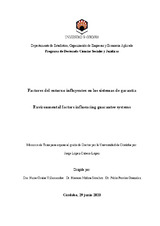Mostrar el registro sencillo del ítem
Factores del entorno influyentes en los sistemas de garantía
| dc.contributor.advisor | Ceular Villamandos, Nuria | |
| dc.contributor.advisor | Molina Sánchez, Horacio | |
| dc.contributor.advisor | Pombo González, Pablo | |
| dc.contributor.author | López-Cubero López, Jorge | |
| dc.date.accessioned | 2020-10-28T09:19:28Z | |
| dc.date.available | 2020-10-28T09:19:28Z | |
| dc.date.issued | 2020 | |
| dc.identifier.uri | http://hdl.handle.net/10396/20634 | |
| dc.description.abstract | Las micro y pequeñas y medianas empresas (mpymes) son los principales agentes económicos para el desarrollo económico de una región. Sin embargo, su reducida dimensión, escaso nivel de garantías, calidad de las mismas y la asimetría en la información, les hace estar sujetas a la dificultad de acceso a financiación con la que poder seguir creciendo y contribuyendo a la creación de empleos y riqueza del país. Las políticas públicas y privadas vuelcan sus esfuerzos en el fortalecimiento de estos agentes económicos. Esta tesis se centra en el estudio de como los factores instituciones, sistema financiero y legal/administrativo, afectan al desarrollo de los Sistemas de Garantía de Crédito. Los sistemas conceden garantías en favor de las pymes facilitándole su acceso a la financiación de las instituciones financieras. Este trabajo empírico se realiza sobre una muestra de sistemas/esquemas de garantía, en el periodo 2004-2016, en 39 países en desarrollo y desarrollados de Latinoamérica y Europa. Los datos interrelacionan dos fuentes: por un lado, las estadísticas de los propios sistemas de Latinoamérica y Europa. Por otro, la información sobre la infraestructura económica de los países recogida por el World Bank. Las variables a explicar se refieren a la difusión del sistema y a su estrategia. El volumen de garantías sobre PIB y el número de pymes beneficiadas se refieren a la difusión. Por su parte, el importe medio de las garantías ofrecidas y las rotaciones de cartera describen la estrategia del sistema. Como variables del entorno, esta investigación ha seleccionado la calidad de la información financiera, la información crediticia compartida, la velocidad con la que se hacen cumplir los contratos en caso de reclamación judicial por impago, la red bancaria, el crédito bancario del país, el grado de eficiencia del sistema financiero (medido por el diferencial de los tipos de interés de los préstamos menos los depósitos) y el PIB per cápita. La calidad de la información financiera es necesaria para el desarrollo de los sistemas de garantía. La actividad de los sistemas de garantía trata de desplegar más actividad donde la protección de los derechos de crédito es menor y las asimetrías informativas que generan la falta de instrumentos de información, lo que revela el predominio del objetivo de adicionalidad. Por su parte, el sistema decide el importe medio de la garantía concedida al empresario desde un prisma de sostenibilidad, en función del nivel de protección de los derechos legales. | es_ES |
| dc.description.abstract | Micro and small and medium-sized enterprises (mpymes) are the main economic agents for the economic development of a region. However, their small size, low level of guarantees, their quality and asymmetry in information, makes them subject to the difficulty of access to financing with which they can continue to grow and contribute to the creation of jobs and wealth in the country. Public and private policies are turning their efforts into strengthening these economic actors. This thesis focuses on the study of how the institutions’ factors, financial and legal/administrative system, affect the development of credit guarantee schemes. The systems grant guarantees for SMEs by providing them with access to bank finance. This empirical work is carried out on a sample of systems, in the period 2004-2016, in 39 developing and developed countries in Europe. The data interrelates two sources: on the one hand, the statistics of the systems themselves in Latin America and Europe. On the other hand, information on the economic infrastructure of countries collected by the World Bank. The dependent variables measure the outreach of the system and its strategy. The amount of guarantees over GDP and the number of recipients report dissemination. The guarantee's average amount and the portfolio turnovers display the system's strategy. As independent variables, this research has selected the quality of the financial information, the shared credit information, the speed at which contracts enforcement in the event of a legal claim for non-payment, the banking network, the country's bank credit, the degree of efficiency of the financial system (measured by the spread in loan rates minus deposits) and GDP per capita. The financial information quality is necessary for the development of guarantee systems. The activity of guarantee systems seeks to deploy more activity where the protection of credit rights is lower, which reveals the dominance of the objective of additionality. Besides, the system chooses the average amount of the guarantee granted to the SMEs from an economic sustainability point of view, depending on the level of legal rights protection. | es_ES |
| dc.format.mimetype | application/pdf | es_ES |
| dc.language.iso | spa | es_ES |
| dc.publisher | Universidad de Córdoba, UCOPress | es_ES |
| dc.rights | https://creativecommons.org/licenses/by-nc-nd/4.0/ | es_ES |
| dc.subject | Pymes | es_ES |
| dc.subject | Financiación | es_ES |
| dc.subject | Entidades bancarias | es_ES |
| dc.subject | Crédito | es_ES |
| dc.subject | Sistemas de garantía | es_ES |
| dc.subject | Información asimétrica | es_ES |
| dc.subject | Adicionalidad | es_ES |
| dc.subject | Sostenibilidad financiera | es_ES |
| dc.title | Factores del entorno influyentes en los sistemas de garantía | es_ES |
| dc.title.alternative | Environmental factors influencing guarantee systems | es_ES |
| dc.type | info:eu-repo/semantics/doctoralThesis | es_ES |
| dc.rights.accessRights | info:eu-repo/semantics/openAccess | es_ES |

